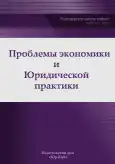Методология адаптации и развития инновационной инфраструктуры территории в цифровой среде
- Авторы: Гилева Т.А.1,2, Галимова М.П.2, Хуссамов Р.Р.1
-
Учреждения:
- Финансовый университет при Правительстве Российской Федерации
- Уфимский университет науки и технологий
- Выпуск: Том 19, № 3 (2023)
- Страницы: 192-200
- Раздел: Региональная и отраслевая экономика
- URL: https://journal-vniispk.ru/2541-8025/article/view/145620
- EDN: https://elibrary.ru/OBVRFF
- ID: 145620
Цитировать
Аннотация
Цель исследования. В статье рассматриваются особенности инновационной экосистемы территории как результата трансформации региональной инновационной структуры в цифровой среде. Показывается роль инновационной инфраструктуры как органической составляющей экосистемы, реализующей свои функции через динамичную структуру экосистемных ролей и различные модели сотрудничества. Целью работы является исследование инновационной экосистемы с позиций ролевой структуры участников (акторов) инновационного процесса, обеспечивающей необходимые условия для осуществления успешной инновационной деятельности, и формирование на этой основе методологических положений и инструментов по адаптации и развитию инновационной инфраструктуры территории к цифровой среде. Выводы. С учетом концепции гиперсотрудничества (hyper-collaboration) определены ключевые методологические положения адаптации и развития инновационной инфраструктуры территории в цифровой среде. Отличительными особенностями предложенного подхода являются: анализ роли и задач инновационной инфраструктуры с позиций динамичной структуры экосистемных ролей, учитывающей многоуровневый и «многоядерный» формат взаимодействия акторов, а также итеративный характер управления в соответствии с технологией дизайн-мышления. Сформирована система принципов и разработана концептуальная модель управления развитием инновационной инфраструктуры территории в условиях цифровой трансформации, предполагающая первоначальное создание минимально жизнеспособной экосистемы с ее последующей настройкой и масштабированием. Для промышленных предприятий как акторов инновационной экосистемы построен конфигуратор экосистемных ролей, позволяющий определить наиболее целесообразную роль в зависимости от соотношения уровней зрелости предприятия и экосистемы в целом. В качестве ключевого элемента (ядра) инновационной инфраструктуры территории выделена цифровая платформа трансфера технологий. Определены ключевые роли участников на платформе и показано, кто из участников экосистемы может эти роли исполнять. Разработан ландшафт сервисов цифровой платформы трансфера технологий в разрезе выделенных ролей для всех этапов процесса трансфера технологий.
Полный текст
Открыть статью на сайте журналаОб авторах
Татьяна Альбертовна Гилева
Финансовый университет при Правительстве Российской Федерации; Уфимский университет науки и технологий
Автор, ответственный за переписку.
Email: t-gileva@mail.ru
ORCID iD: 0000-0002-2429-2779
SPIN-код: 7272-9881
доктор экономических наук, доцент; профессор департамента менеджмента и инноваций; главный научный сотрудник
Россия, Москва; УфаМаргарита Петровна Галимова
Уфимский университет науки и технологий
Email: polli66@mail.ru
ORCID iD: 0000-0002-5139-4375
SPIN-код: 1804-5792
кандидат экономических наук, доцент; доцент кафедры экономики предпринимательства, ведущий научный сотрудник
Россия, УфаРаил Римович Хуссамов
Финансовый университет при Правительстве Российской Федерации
Email: karabure@mail.ru
SPIN-код: 5434-6777
кандидат экономических наук, доцент; доцент департамента менеджмента и инноваций
Россия, МоскваСписок литературы
- Акбердина В. В., Василенко Е. В. Инновационная экосистема: теоретический обзор предметной области // Журнал экономической теории. 2021. Т. 18. №3. С. 462–473.
- Бек Н.Н., Гаджаева Л.Р. Открытые инновационные бизнес-модели и стратегии: особенности, проблемы, перспективы развития // Вестник Московского университета. Серия 6: Экономика. 2018. № 1. С. 140–159.
- Васильева Ю.С. Анализ инновационной инфраструктуры регионов Центрального федерального округа России // Инновации.2021. № 2. С. 83–92.
- Виханский О.С, Каталевский Д.Ю. Конкурентное преимущество в эпоху цифровизации // Российский журнал менеджмента. 2022. № 1. С. 5–27.
- Волконицкая К.Г., Ляпина С.Ю. Развитие региональных инновационных систем // Интернет-журнал «Науковедение». 2014. № 5. URL: https://publications.hse.ru/articles/139541494.
- Галькевич А.И., Назаров А.А., Галькевич И.А. Интеллектуальная интегральная цифровая платформа обработки данных в системах мониторинга, прогнозирования и принятия решений для цифровой экономики // Цифровая экономика. 2018. № 3. С. 13–28.
- Гилева Т.А., Галимова М.П., Горшенина М.Е. Проектирование инновационной инфраструктуры предприятия на основе развертывания функции качества // Научно-технические ведомости Санкт-Петербургского государственного политехнического университета. Экономические науки. 2018. Т. 11. № 1. С. 122–135.
- Грив Г., Роули Т., Шипилов А. Преимущество сетей. Как извлечь максимальную пользу из альянсов и партнерских отношений. М.: Альпина Паблишер, 2014. 259 с.
- Гумерова Г.И., Кокурина А.А., Шаймиева Э.Ш., Трифонова Н.Н. Цифровые платформы креативных индустрий: опыт России и Китая // Проблемы экономики и юридической практики. 2023. Т. 19. № 1. С. 293–300.
- Доброва Е.Д. Роль инновационной инфраструктуры в обеспечении формирования цифровой экономики России // Вопросы инновационной экономики. 2021. № 2. С. 485–506.
- Донцова О.И., Абдикеев Н.М., Бекулова С.Р. Цифровая трансформация промышленности: оценка зрелости организаций // Проблемы экономики и юридической практики. 2022. № 5. С. 216–221.
- Исмагилова Л.А., Галимова М.П., Гилева Т.А. Проектирование цифровой платформы трансфера технологий: методология и функционал // Инновационная деятельность. 2020. № 4. С. 53–65.
- Ицковиц Г. Модель тройной спирали // Инновации. 2011. № 4. С. 5–10.
- Караяннис Э., Григорудис Э. Четырехзвенная спираль инноваций и «умная специализация»: производство знаний и национальная конкурентоспособность // Форсайт. 2016. Т. 10. № 1. С. 31–42.
- Клейнер Г.Б. Экономика экосистем: шаг в будущее // Экономическое возрождение России. 2019. № 1. С. 40–45.
- Adner R. Match your innovation strategy to your innovation ecosystem // Harvard Business Review. 2006. Vol. 84. Is. 4. Pp. 98–107.
- Budden Р., Murray F. Strategically Engaging with Innovation Ecosystems. MIT Sloanreview. July 2022. URL: https://sloanreview.mit.edu/article/strategically-engaging-with-innovation-ecosystems/.
- Deloitte. Ecosystems 2021—what will the future bring? 2019. URL: https://www2.deloitte.com/ch/en/pages/financial-services/articles/ecosystems-2021-was-bringt-die-zukunft.html.
- Gileva T.A., Galimova M.P., Babkin A.V., Gorshenina M.E. Strategic Management of Industrial Enterprise Digital Maturity in a Global Economic Space of the Ecosystem Economy // IOP Conference Series: Earth and Environmental Science. Сер. «International Round Table Industry 4,0 Technologies in the Arctic». 2021. Рp. 012022.
- CeRRI—Center for Responsible Research and Innovation. Innovation Ecosystem Strategy Tool. 2021. URL: https://www.cerri.iao.fraunhofer.de/content/dam/iao/cerri/de/Leistungsspektrum/InnovationEcosystemStrategies/CeRRI_Innovation%20Ecosystem%20Strategy%20Tool_en.pdf.
- Granstrand О., Holgersson М. Innovation ecosystems: A conceptual review and a new definition. Technovation. 2020. Vol. 90–91.
- Kolk M., Eagar R. Ecosystem Innovation. The growth of hyper-collaboration in a fast-moving world. Artur D Little Prism. 2017. № 1. 25 р. URL: https://www.adlittle.com/en/insights/prism/ecosystem-innovation.
- Lyman M., Ref R., Wright O. Corner Stone of Future Growth: Ecosystems. Accenture. 2018. 15 p.
- Rozalska-Lilo M. Innovation Ecosystem Maturity. 2019. URL: https://medium.com/creatorspad/innovation-ecosystem-maturity-3775812b3d3e.
Дополнительные файлы










